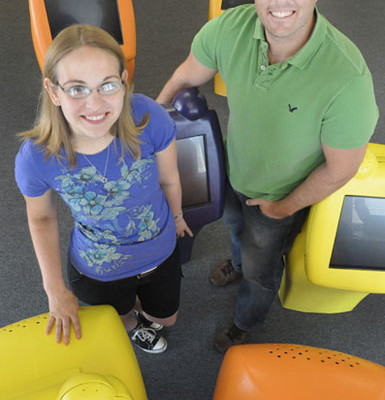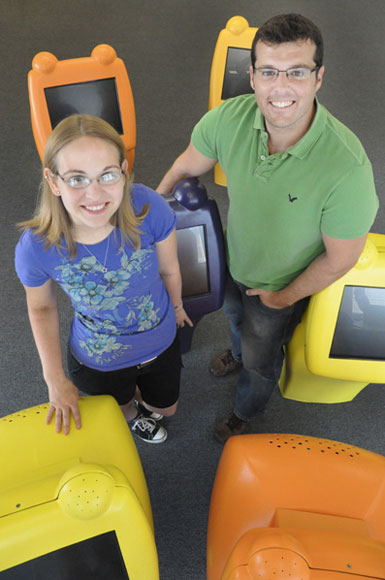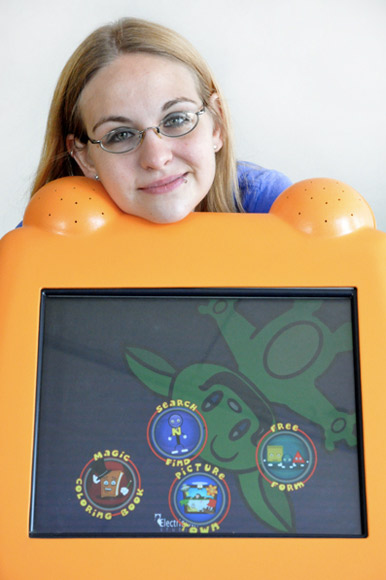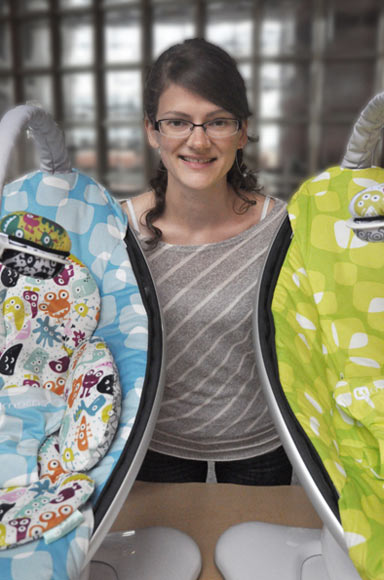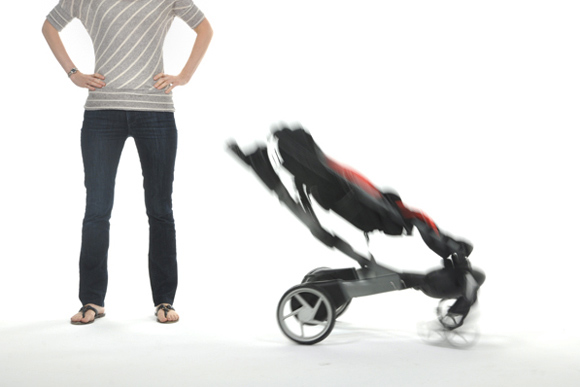Editor's note: This story originally appeared in sister publication Kidsburgh.
A sock monkey slumped on a shelf is the most ordinary childhood artifact in the offices of 4Moms in the Strip. Otherwise, the workshop of this seven-year-old high-tech kids' equipment company looks like a robot repair facility.
At one engineering work station, two young employees are creating prototypes for, well, something 4Moms' spokesperson Emily Cappo “can’t really talk about,” she says. It's a stroller frame with wheels and what looks like a computer board.
Given 4Moms's current products, the use of high-tech to improve an ancient parenting task — pushing an infant along — makes sense.
The Cleanwater Infant Tub was 4Moms' first product. It not only allowed fresh water to flow in as dirty water flowed out of the tub, but it had a digital thermometer. The mamaRoo was next — an alternative to swings and bouncy seats, its five movement choices were chosen by placing accelerometers on moms and measuring their movements.
“Babies love it. Moms love it. Hospitals use it in their NICUs,” says Cappo. It has already been updated this past May, offering a faster speed, a sleeker interface, a locking toy bar on top, a one-year warranty and six new fabric designs.
This past Jan. 6, the Origami debuted as the world’s first power-folding stroller. It charges itself, and your cell phone, during the walk. It has daytime and nighttime lights, and an LCD-lit dashboard with two odometers, a thermometer and speedometer.
Room for Dramatic Improvements
4Moms just debuted its Breeze play yard, which opens from the center and folds back up in similarly smooth motions in less than 2 seconds.
“The whole idea behind 4Moms,” says Cappo, is that “as technology becomes less and less expensive, there’s more and more room for innovation.” Your basic stroller, for instance, was essentially the same for decades, despite the brighter colors and lighter construction. “We take robotic technology and use it to update these products and make them real useful to parents.”
In another corner of the 4Moms office is a competitor's playpen, the product of a giant corporation.
“It’s always important to know what’s out there, what parents can use now,” says Cappo. “We’re not going to make products that are incrementally better; we want to make products that are dramatically better – the kinds of products you see and you say, 'Where was this?'”
Elsewhere around the office are a photo studio and giant printer for marketing materials, as well as a map with arrows inside the 17 countries where 4Moms is selling now or will soon have a distribution agreement. The mamaRoo and Origami have gained national attention and were featured on The Ellen Degeneres Show as well as The Today Show and How I Met Your Mother.
But 4Moms is still a Pittsburgh company, relying heavily on Carnegie Mellon University for recruiting new employees, holding robotics workshops for local kids and signing up local parents for field-testing new products. About 2,000 people signed up to walk with the Origami on its first testing day.
Passing the Test
Parent-testing is most useful for finding a product's faults before release. Members of the first four groups testing the Origami, for instance, said that re-charging it at home, especially if it required an extension cord, would be a product killer, Cappo says. So the company devised the automatic recharging feature.
Are Pittsburgh parents any different as a test market than those in other cities. Not really, says Cappo — “other than the fact that we keep getting requests for a Steelers-colored mamaRoo or a Penguins-themed Origami.”
At Electric Owl Studios in East Liberty, CEO Patrick Mittereder learns to improve his products by watching kids play with and even break them.
Electric Owl's main product is the K.I.C.K. (Kid's Interactive Creative Kiosk), currently in place in hospital waiting rooms in 27 states and two other continents. It uses a touch screen and game software to help kids cope with the fear inherent in such a setting.
Early tests took place in Carnegie Mellon University's daycare, when Mittereder was a student at CMU's Entertainment Technology Center in 2006. He worked with a steering committee from UPMC Children's Hospital, devising a search-and-find game on the model of I Spy or Where's Waldo? for kids up to age 8.
So many kids banged on the K.I.C.K.'s first touch screen that it broke, so Mittereder substituted high-end industrial materials. The kids also taught him some psychological lessons: nothing is as obvious as it seems. The interface for the K.I.C.K.'s most popular game, The Magic Coloring Book, starts out as black and white, then turns to color and surprises kids with animation. Trouble was, kids couldn't find the “Go” button that started the animation. He added giant red arrows. He added a voice: “Hey, press the go button.” Nothing. A final move to the bottom of the screen, along with constant blinking, did the trick.
Recently, Electric Owl has branched out the K.I.C.K. to serve in resorts and airports, creating custom pages and kiosk designs.
“Right now, we make any kind of game that we think will be fun but promotes creativity,” says Mittereder. Electric Owl games are about artistry, not about beefing up a score or getting to the next level. He likes seeing the games helping kids to cope.
“There was a kid playing on one kiosk,” he recalls observing. “In Picture Time, there is an owl in the tree. The kid had a stuffed owl with him. He kept using the owl to touch the screen to make the hooting sounds.
gt;”Friends of mine who have kids have called to say, 'Hey, stuck at the hospital. Thanks!'”
Starting a Path to Success
The online learning company Zulama was begun nearly three years ago by Nikki Navta, who had been working in educational publishing for 20 years when she noticed that textbook developers were dragging their feet on using technology to improve or replace their products.
So she and three partners aimed to recruit top educators to take their established courses and transfer them online. “We wanted to build an online course offering tool that will help people who are not instructional designers to take the material they were already using in their classes and create a rich online educational environment,” Navta says.
Today the site offers Advanced Placement courses, business, technical and creative writing and several history courses, all for high school students. There's also horror fiction-writing class by a published horror author. A significant part of Zulama's course offerings constitute the Video Game Academy, developed by two CMU faculty members to inspire future videogame designers and 3D artists. The company surveys students and schools to see what's in demand and also talks to educators who have potential courses.
“They're designed to be the kinds of courses that give students a peak into careers and topic areas they might want to pursue,” she says. “The courses are written by people with a real passion for their content, so they are very different from most courses high schoolers take.” Courses this past spring semester attracted 150 students from private, public and charter schools, Navta reports.
“A lot of the online products out there are remedial products or are core courses,” she adds. Zulama courses are meant to offer electives and material that schools are now cutting, due to budgetary constraints. “The students who take our courses are really looking ahead to careers.”
Concludes Navta: “How do you know what you want to do when you grow up if you can't try different things?”
